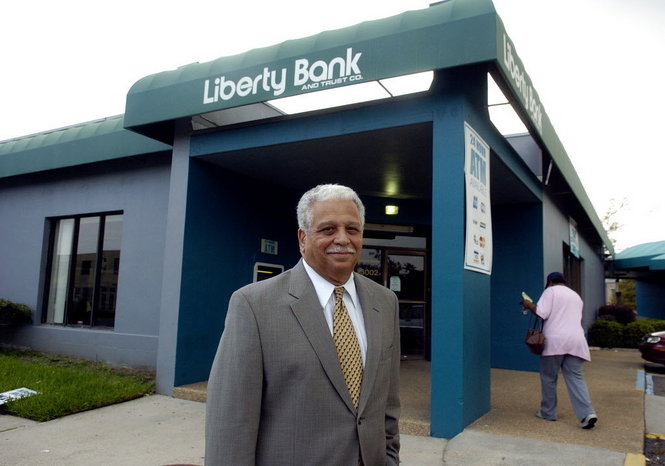![1BlackbanksLiberty Bank and Trust CEO Alden McDonald[7]](https://themississippilink.com/wp-content/uploads/2016/07/1BlackbanksLiberty-Bank-and-Trust-CEO-Alden-McDonald7.jpg)

By Michael H. Cottman
Urban News Service
Baltimore-based attorney Jelani Murrain plans to transfer his hard-earned money to an institution of financial empowerment: A black-owned bank.
“The fact that black people have dealt with financial discrimination is a matter of record,” Murrain, a father of three young children, told Urban News Service.
Murrain, 38, said he and his wife decided last week to open an account with Atlanta’s Citizens Trust Bank.
“A strong, vibrant black-owned bank will hopefully ensure black people have an alternative if faced with financial discrimination in the future,” said Murrain, who drives to work one hour each way, every day, between Washington, D.C. and Baltimore.
“A strong Citizens Trust Bank, of course, will provide better financial services to all people of Atlanta, not just black people,” he said. “The success of Citizens Trust is a win for the black community and the United States.”
While Washington’s Industrial Bank is black-owned, Murrain prefers to invest in Citizens, since his father lives in Atlanta.
Murrain is not alone.
More than 8,000 people opened accounts at Citizens Trust between July 13 and 18, according to news accounts. New customers flooded the bank after hip-hop artist Killer Mike urged black residents to transfer their money there.
And officials at Houston’s Unity National Bank say more than 700 new customers have opened accounts in the past week.
“It’s fantastic. It’s a beautiful thing. We’re blessed,” said John Scroggins, president and CEO of Unity. “It’s been overwhelming.” Scroggins said eight to 10 people open accounts in a typical week.
Scroggins said a local pastor told him he would withdraw his money from Chase Bank and hand Unity a check for $250,000.
“I’ve been in the lobby shaking hands and thanking customers,” Scroggins said. He described them as African-American men and women professionals. “One customer told me, ‘The cause is worth the wait.’” The cause, Scroggins said, stemmed from recent, high-profile police shootings of black men.
“But,” he said, “the cause quickly turned to a social consciousness about black empowerment and supporting black-owned businesses.”
Scroggins said he plans to continue re-investing in the black community by approving more small-business loans.
The surge in new accounts at Citizens, Unity and other black-owned banks springs, in part, from civil-rights leaders who consistently have pleaded with black Americans to support black-owned financial institutions.
But this sudden interest in black-owned banks also coincides with black Americans’ protests against the police killings of Alton Sterling in Baton Rouge and Philando Castile near Minneapolis.
So, aside from symbolism, what does money in a black-owned bank achieve for the black community that it doesn’t deliver in a mainstream establishment?
Some black Americans believe investing in a black bank will help circulate more money in the black community, revive neighborhoods, secure a black economic power base and enhance black customers’ chances of receiving small-business loans.
There were 21 black-owned banks in America with approximately $4.7 billion in assets in 2013, according to HBCU Money. But times have changed: There were 54 such banks in 1994, the Federal Deposit Insurance Corporation reports.
Murrain, however, said he likes the stability of Citizens Trust Bank, which was founded by five black businessmen in 1921. The nation’s third-largest African- American-owned bank’s assets exceed $350 million, according to published reports.
“We are proud to celebrate 95 strong years of service to our customers and our community,” says the bank’s website.
Meanwhile Patrice Gaines, 67, said she will follow her daughter’s lead.
Her daughter, Andrea Carter of Atlanta, 47, transferred her money to Citizens.
Gaines plans to open an account with black-owned, New Orleans-based Liberty Bank. It was founded in 1972 with assets of $2 million. Alden J. McDonald Jr. has led Liberty since day one and has grown its holdings to $374 million, according to the bank’s website.
“Andrea’s actions reminded me that I have a much longer view of this country and its history,” said Gaines, a former Washingtonian who now lives in Lake Wylie, South Carolina.
“She never saw U Street in Washington, D.C. when it was lively with black businesses, including a black bank,” she said.
Gaines said she is proud to invest in Liberty Bank, which has opened branches in Kansas, Mississippi, Missouri and Texas.
“There was a pride that came over me when I walked on U Street,” Gaines said. “So, maybe this time is the time when my daughter can experience a fraction of the pride I felt when I lived in a neighborhood surrounded by black-owned businesses, and I followed my mother into the black-owned bank to get money out of her account.”
Several African-American celebrities also plan to open accounts with black-owned banks. Performers Usher, Killer Mike and Jermaine Dupri joined Citizens Trust Bank in February.

Be the first to comment